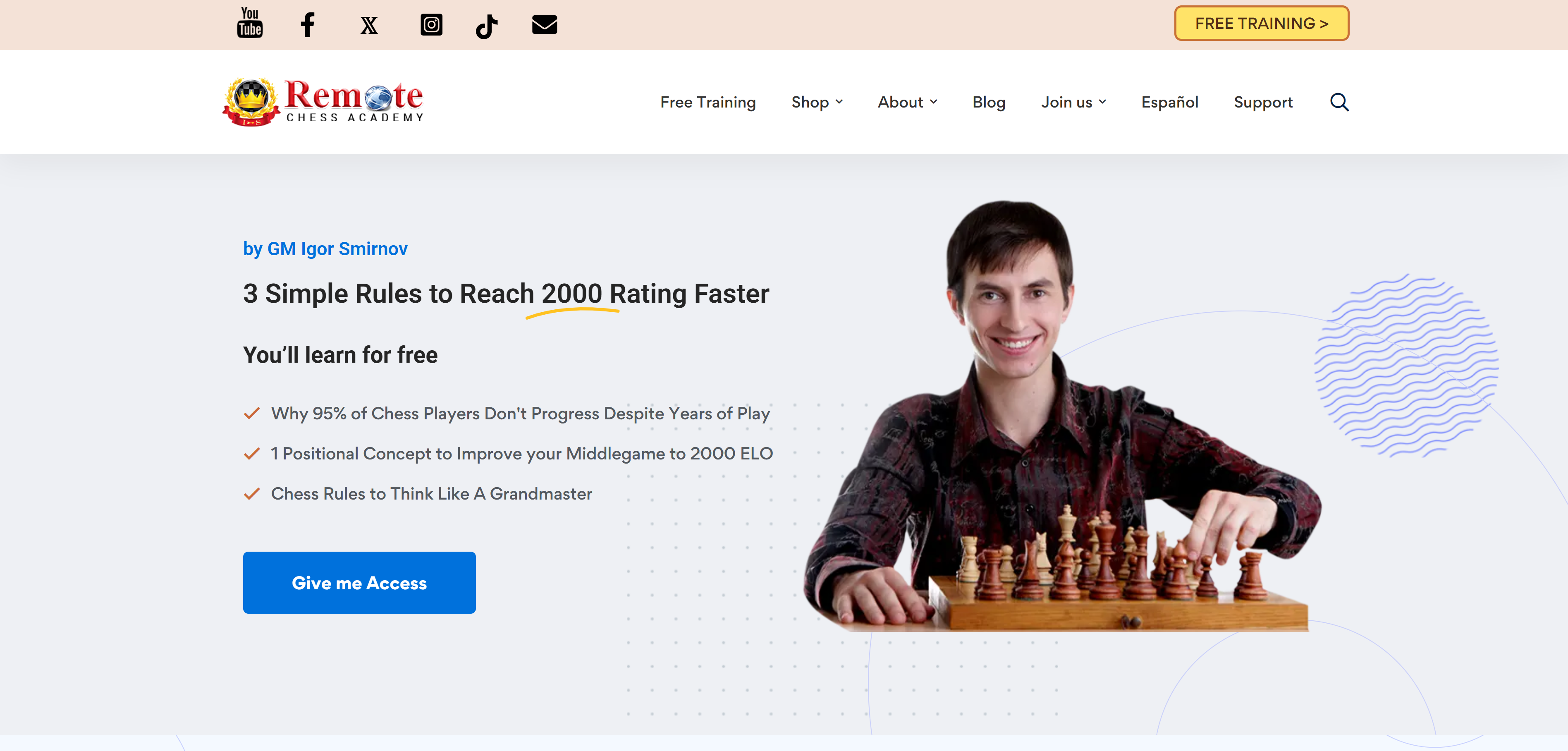Remote Chess Academy Review: An In-Depth Look at Its 2025 Offerings
By Halie Johnson | Published on May 22, 2025 | Estimated 10 min read

Remote Chess Academy gives chess players a solid platform to boost their skills. The academy designs its learning experience for beginners and advanced players alike.
With a wide range of courses, users can work on their strategic thinking. The goal is to help players actually improve their game, not just absorb theory.

When you stack it up against other chess education sites like Chess.com or iChess.net, Remote Chess Academy stands out for its unique teaching methods and personalized feedback. Chess.com has a huge community, but Remote Chess Academy leans into deep lessons and a step-by-step progression.
This tailored approach really seems to hit home for dedicated learners. If you want to save some cash, check out the Remote Chess Academy coupon here.
What Is Remote Chess Academy?
Remote Chess Academy is an online platform that teaches chess at all levels. It focuses on structured lessons and quality instruction from experienced coaches.
Origins and Founders
Graham Burgess, a respected chess master, founded Remote Chess Academy with a team of chess enthusiasts and educators. They wanted to share knowledge from self-taught grandmasters and pros, making chess education more accessible.
The academy started as a response to the growing need for online chess learning. Since then, it’s grown into a well-known resource for chess students around the world.
Mission and Teaching Approach
Remote Chess Academy aims to make top-notch chess education available to everyone, no matter where they live. The teaching style blends theory with practical exercises, so students really absorb concepts.
Key features include:
- Video Lessons: Tutorials that cover a range of topics.
- Interactive Quizzes: Quick checks to reinforce learning.
- Coaching: Experienced coaches offer personalized guidance.
This mix helps students sharpen their skills and encourages strategic thinking. For deals, check the Remote Chess Academy coupon. If you want to dig deeper, visit Remote Chess Academy.
Course Offerings and Curriculum Structure

Remote Chess Academy organizes its courses for different skill levels. You’ll find video lessons, practical exercises, and even homework to help you put strategies into practice.
Types of Chess Courses
The academy offers:
- Beginner Courses: Basics like piece movement and simple tactics.
- Intermediate Courses: Openings, middlegame strategies, and building on fundamentals.
- Advanced Courses: Endgames, complex tactics, and opponent analysis for seasoned players.
Students can pick what fits their current level or chess ambitions.
Content of Video Lessons
Video lessons are at the heart of the curriculum. Each one sets clear goals and uses:
- Visual Demonstrations: Graphics and animations to break down ideas.
- Analytical Commentary: Instructors talk through their thinking behind each move.
- Example Games: Famous matches to show strategies in real action.
These lessons aim to be both engaging and practical—no dry lectures here.
Practical Part and Homework Assignments
To make sure lessons stick, Remote Chess Academy mixes in hands-on practice. You’ll get:
- Interactive Exercises: Online puzzles that let you try out tactics and strategy.
- Homework Assignments: Exercises that push you to use new concepts on your own.
Assessments help track your progress and highlight where you need to focus. This combo of theory and practice makes the learning experience more meaningful.
Want more info? Visit Remote Chess Academy or grab a Remote Chess Academy coupon.
Effectiveness for Chess Improvement
Remote Chess Academy’s structure genuinely helps players improve. By covering different aspects of the game, it gives players the tools to get ahead.
Impact on Chess Tactics
The academy puts a big emphasis on tactical training. Players work through exercises on themes like forks, pins, and discovered attacks—core stuff for anyone hoping to win more games.
These exercises build pattern recognition. Players start spotting tactics faster and calculating with more confidence in real games.
Real-World Chess Career Outcomes
Plenty of users report that Remote Chess Academy has made a real difference in their tournament play. They talk about better results and feeling more confident at the board.
By following the academy’s structure, users often see their ratings go up. Some even say it’s more effective than old-school coaching.
Calculate Variations Skill Development
Calculating variations is a must in chess, and the academy has tools to help. Interactive lessons push players to think several moves ahead and weigh different outcomes.
This approach sharpens decision-making in complicated positions. It also helps reinforce opening theory and endgame basics.
If you’re curious about improvement, you might want to check out the Remote Chess Academy coupon for discounted training.
Learning Experience
The learning experience at Remote Chess Academy really hinges on tutor interaction and email support. Both play a big role in helping students progress.
Interaction With Chess Tutors
Students get to work directly with experienced tutors, who tailor their teaching to each learner. This hands-on approach lets students ask questions and get immediate feedback.
Live sessions are a highlight—students can analyze their games with tutors in real time. The teaching styles vary, so you’re likely to find someone who matches your vibe.
Email Support and Communication
The academy answers emails quickly, which is a lifesaver if you prefer written communication or can’t make live sessions. Tutors and staff usually respond fast, offering advice and extra resources.
They’ll send updates on your progress and let you know about upcoming lessons. This ongoing communication keeps students in the loop and motivated.
For deals, you can always use the Remote Chess Academy coupon.
Production Quality of Lessons
Production quality really impacts the Remote Chess Academy experience. Both audio and visuals matter a lot in online learning.
Audio Quality and Common Issues
Most video lessons have clear audio. Still, a few users have pointed out occasional background noise or echo in some sessions.
- Common Problems:
<ul> <li>Background noise in a handful of lessons.</li> <li>Echo during some live sessions.</li> </ul> </li>
These issues can break your focus. Honestly, a little investment in better audio gear could go a long way here.
Visual Clarity and Interface
The visuals usually look sharp, with high-res graphics and clear board setups. The interface is pretty user-friendly, making it easy to jump between lessons.
Some students mention that small text or diagrams can be hard to see if you’re on a phone or small screen. That’s a bit of a pain, especially when you’re trying to follow a tricky position.
Overall, Remote Chess Academy’s production quality holds up well next to competitors like Chess.com or iChess.net, but there’s always room for tweaks. If you’re shopping around, don’t forget about Remote Chess Academy coupon deals for better value.
Customer Feedback and Reputation

Customer feedback gives you a real sense of what Remote Chess Academy delivers. Reviews, ratings, and BBB reports all paint a picture of its reputation.
Student Testimonials
A lot of students rave about the instruction here. They especially like learning from grandmasters and getting detailed game analysis.
Some negative comments focus on course prices or limited availability. While a few find the cost steep, most agree the value is there. Overall, the feedback is positive, with many students feeling the academy meets their chess needs.
Rating Across Platforms
Remote Chess Academy scores well across review sites—usually between 4.5 and 5 stars. People like the structured curriculum and the way lessons build on each other.
Trustpilot reviews echo this, with users appreciating materials suited for all skill levels. The accessible design and resource library also get a lot of love.
Better Business Bureau Reports
The BBB gives Remote Chess Academy an A rating, which says a lot about its reliability. Customers mention that the academy resolves issues quickly and fairly.
Most complaints are minor and usually involve billing or course access. The team’s quick responses seem to keep most people happy. This strong BBB relationship helps build trust, especially for those eyeing deals like the Remote Chess Academy coupon.
Legal and Ethical Considerations

The legal and ethical side of online education matters, especially for chess platforms. Consumers should know their rights and what to expect.
Consumer Protection Laws
Consumer protection laws are there to keep things fair. Educational platforms have to be upfront about fees, course content, and what you can expect.
Remote Chess Academy needs to stick to these rules by providing clear terms and refund policies. Students should always know where they stand if something goes wrong.
Addressing Misrepresentation Allegations
Misrepresentation happens when a business gives out false information that sways consumer choices. If someone accused Remote Chess Academy of this, it could really hurt its credibility and shake consumer trust.
Clear, honest marketing about instructional quality and instructor backgrounds matters a lot. If the platform stretches the truth about how effective it is or how many students succeed, it risks crossing into deceptive business territory.
Consumers can push back in these cases. They might ask for refunds or even seek compensation if they feel misled.
Remote Chess Academy can head off most of these issues by being open and straightforward in its communication. That kind of transparency can go a long way in building trust within the chess education world.

The Remote Chess Academy gives chess lovers at all levels some pretty solid resources. Its structured courses focus on skill-building, though it's up to each student to decide whether the offerings fit their own goals.
Who Should Consider These Courses?
Players who want a methodical approach to learning chess might get the most out of Remote Chess Academy. Beginners can start with lessons that break down basic ideas and strategies.
Intermediate players looking to sharpen their tactics or openings could do well here, too. The academy encourages students to analyze each move, which helps develop critical thinking.
If you learn best at your own pace and enjoy video-based lessons, this platform might be right up your alley.
Alternatives for Aspiring Chess Players
If you're thinking about learning chess, you've got a bunch of options. Sites like Chess.com and Lichess pop up right away, offering both free and paid stuff—lessons, puzzles, and tons of online games.
These platforms feel pretty lively, honestly. There's a real sense of community, with people chatting, competing, and sometimes even arguing about openings.
Chess Tempo stands out for folks who just want to drill tactics or get sharper at endgames. It's a bit more focused, maybe less social, but super useful if you already know what you want to work on.
Some players crave a personal touch. In that case, you could try one-on-one lessons through local chess clubs or hop onto something like iChess.net. That site connects you with actual coaches—some pretty experienced ones, too.
It's not a one-size-fits-all deal. What works for one person might bore someone else, so it really comes down to how you like to learn.
Maybe You're Interested In Shopping At These Stores
About the Author: Halie Johnson
Halie Johnson is a Marketing Manager and the founder of RetailReviewHub, where she combines over a decade of experience in affiliate marketing and deal hunting to help users save money with confidence. With a deep understanding of consumer behavior and pricing strategy, Halie is dedicated to writing clear, unbiased product reviews and sharing the best deals across the web. When she’s not digging through coupon databases or analyzing offer performance, she enjoys testing products first-hand and writing savings guides that actually work. Follow Halie on her journey to smarter shopping!
Related Posts

Top Independence Day Deals 2025 – Save Big with Verified Coupons at RetailReviewHub
Independence Day is a prime time for shoppers to find great discounts...

Score Explosive July 4th Discounts – Curated Offers on RetailReviewHub
Independence Day 2025 brings a great chance to save on many products w...